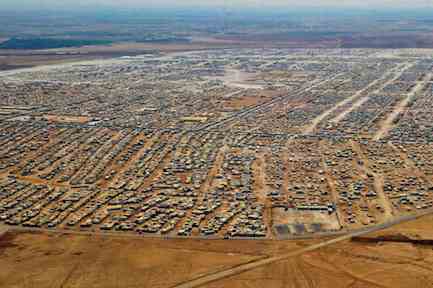The camps they are building will become the cities of tomorrow, it has been claimed. An expert in humanitarian made the statement as it’s revealed the average amount of time people spend in the camps is a staggering 17 YEARS.
Kilian Kleinschmidt worked with the United Nations High Commission for Refugee s (UNHCR) for 25 years.
The former head of the Zaatari Refugee Camp in Northern Jordan says: “In the Middle East, we were building camps: storage facilities for people. But the refugees were building a city.”
“I think we have reached the dead end almost where the humanitarian agencies cannot cope with the crisis,” he said.
“These are the cities of tomorrow,” he continued. “The average stay today in a camp is 17 years. That’s a generation. Let’s look at these places as cities.”
The 53-year-old’s comments come at the end of a year which will be remembered for its vast refugee numbers, and the seeming unwillingness of host countries to offer them help.
The Zaatari camp which Kilian oversaw has now swollen to provide accommodation for 160,000 Syrians.
As such, it’s identified as the Jordan’s fifth largest city, with 6,000 people a day arriving after fleeing war against Bashar al-Assad’s dictatorship in Syria.
The overcrowded 2.8 square mile camp costs £700,000 a day to run.
There are no trees or bushes to provide shade on sun-baked land which was previously snake and scorpion-infested scrubland.
But there are football pitches, field hospitals, schools and a children’s playground aimed at keeping some 60,000 youngsters busy.
Every day some 12 to 15 babies are born at Zaatari.
Now running his own aid consultancy, Switxboard, Kilian says that far from being resisted, migrants should be used to boost the economy.
He names Germany, with 600,000 job vacancies and a need for tens of thousands of new apartments, as a country where this could be put into practice.
ASYLUM POLICY
In the aftermath of the Nov. 13 terror attacks in Paris, anxiety is understandable, said Bill Canny, executive director of the U.S. Conference of Catholic Bishops’ Office of Migration and Refugee Services. But governors and other politicians are not responding reasonably by calling for a “pause” or even the termination of efforts to resettle Syrian refugees in the United States. Refugees being selected for U.S. resettlement, he said, “are certainly not a credible threat by any way, shape, or means.”
“The people who are fleeing ISIS are fleeing for the same reasons that anyone flees,” he said. “They’re being bombed. They’re not being allowed to express their freedom of religion. There are Christians and other minorities involved.” As a free, open society, it is not in America’s interest, he said, “to shut the doors to folks who are fleeing persecution.”
Beyond their legitimate asylum claims, he adds, people coming into the United States through the refugee resettlement program are the most vetted migrants now entering the country. “They go through an extensive security check,” Canny said, that can take anywhere from 18 to 24 months.
The lengthy vetting process begins in refugee camps in the Middle East and Europe, where many have been “languishing for years.” Many of those accepted for
resettlement already have family connections in the United States, according to Canny, and many of the people accepted by asylum authorities come from among the most vulnerable of refugee populations, “the elderly and the sick, often unaccompanied children.”
“It’s a much different operation than what we [are seeing] for example in Europe, where people show up at the shores or at the borders.”
He said the U.S. bishops are confident that the current “extensive” security protocol is more than adequate to guard against infiltration by ISIS or other terrorist elements. That confidence apparently is not shared in powerful quarters around the country.
Republicans in the House of Representatives on Nov. 19 earned a veto-proof majority, 289 to 137, on a bill that in effect would block Syrian and Iraqi refugees from entering the United States, and governors in at least 30 states have called for an end to Syrian resettlement until security concerns can be addressed.
But that level of concern may not be justifiable against the nation’s actual experience with refugee resettlement. Canny was unable to recall in decades of these efforts a single instance of an asylum seeker striking out in a terrorist act within the United States. Indeed, the State Department reports that of the 785,000 refugees resettled since Sept. 11, 2001, only 12 have been arrested or removed because of terrorism concerns, and none of those charges reflected concern about acts of domestic terror.
Up until the terrorist attacks on Paris on Nov. 13, the U.S. Catholic community had been showing great generosity to Syrian refugees, Canny said. His office had actually been expanding its resettlement network to meet the desire of Catholic parishes to be more “helpful and to welcome these people who have suffered so much for the last five years.”
He added, “We want to show them solidarity and we want to show them love, as of course Pope Francis told us to do during his recent trip to the United States.” Canny points out that among the Syrians seeking refuge in the United States are Christians who had been facing a kind of genocide at the hands of ISIS. That does not mean the bishops conference at all intends to join some voices that have suggested that only Syrian Christians should be offered refuge in the United States. Ninety percent of ISIS victims are their fellow Muslims, he said. “Again, these people are fleeing terrorism. They’re fleeing oppression.” They want to get away from the war, he said, away from ISIS, to come to America as generations of people before them did “to establish new lives.”
Auto Amazon Links: No products found.

